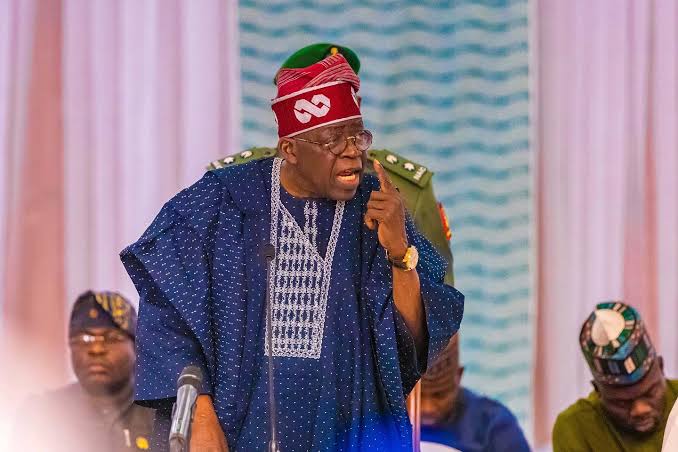President Bola Tinubu on Thursday signed four executives orders for immediate enforcement, suspending the
5% Excise Tax on telecommunication services, increased Excise Duties on locally manufactured products.and import duties on vehicles.
A presidential spokesman, Dele Alake said the executive orders were in line with Tinubu’s avowed commitment to stamp out arbitrary and business-unfriendly policies and multiple taxation in the country.
By the orders, Presidwnt Tinubu has suspended or shifted the commencement dates of the Finance Act and policies signed by ex-President Muhammadu Buhari from May 23, 2023 to September 1 and October, 2023 respectively.
The Executive Orders include:
1. The Finance Act (Effective Date Variation) Order, 2023, has now deferred the commencement date of the changes contained in the Act from May 23, 2023 to September 1, 2023. This is to ensure adherence to the 90 days minimum advance notice for tax changes as contained in the 2017 National Tax Policy.
2. The Customs, Excise Tariff (Variation) Amendment Order, 2023. This has also shifted the commencement date of the tax changes from March 27, 2023 to August 1, 2023 and also in line with the National Tax Policy.
3. The President has given an Order suspending the 5% Excise Tax on telecommunication services as well as the Excise Duties escalation on locally manufactured products.
4. Suspension of the newly introduced Green Tax by way of Excise Tax on Single-Use Plastics, including plastic containers and bottles. In addition, the President has ordered the suspension of Import Tax Adjustment levy on certain vehicles.

The Special Adviser on Special Duties, Communication and Strategy, Dele Alake, announced the presidential interventions on Thursday at a media briefing with State House correspondents in Abuja.
The text of the briefing is titled, “Presidential Interventions To Address Key Concerns Of Manufacturers And Other Stakeholders Regarding Some Recent Tax Changes.’’
“As a listening leader, the President issued these orders to ameliorate the negative impacts of the tax adjustments on businesses and chokehold on households across affected sectors.
“His Excellency will not exacerbate the plight of Nigerians,” Alake, a former Commissioner for Information in Lagos State, said.
According to him, the president has shifted the commencement date of the tax changes from March 27, 2023 to August 1, 2023 and also in line with the National Tax Policy.
Alake said:“This is to ensure adherence to the 90 days minimum advance notice for tax changes as contained in the 2017 National Tax Policy.
“Upon taking over the reins of government, the President promised to run a government that will not make life difficult for Nigerians or asphyxiate corporate entities in spite of the challenges the Federal Government is irrevocably committed to this pledge.
“You will all recall that prior to the advent of this Administration, certain tax changes were introduced via the Customs, Excise Tariff (Variation)
Amendment Order, 2023 (henceforth referred to as “the Order”) published on the 8th of May 2023 and the Finance Act, 2023, which was signed into law on the 28th of May 2023.
“Among others, the Order introduced new Excise Duty on Single Use Plastics (SUPs), higher Excise Duties on some locally manufactured products, including alcoholic beverages and tobacco products, and Green Tax by way of Import Tax Adjustment on certain categories of imported vehicles.
“The Tinubu Administration has since noticed that some of the tax policies are being implemented retroactively with their commencement dates, in some instances, pre-dating the official publication of the relevant legal instruments backing the policies. This lacuna has created some challenges of implementation.
“Indeed the intentions behind upward adjustments of some of these taxes are quite noble. They were designed to raise revenue as well as address environmental and health issues of concern.
“However, they have generated some significant challenges for, and elicited serious complaints amongst key stakeholders as well as in the business community.
“Let me mention some of the problems we have identified with the aforementioned tax changes. A document known as the 2017 National Tax Policy approved by the Federal Executive Council of the last administration prescribes a minimum of 90 days notice from government to tax-payers before any tax changes can take effect.
“This global practice is done with a view to giving taxpayers and businesses reasonable time to adjust to the new tax regime.
“However, both the Finance Act 2023 and the Customs, Excise Tariff Order 2023 did not give the required minimum notice period, thus putting businesses in violation of the new tax regime even before the changes were gazetted.

“As a result of this, many of the affected businesses are already contending with the rising costs, falling margins and capacity underutilization due the various macroeconomic headwinds as well as the impact of the Naira redesign policy.
“Gentlemen of the press, you will also recall that Excise Tax increases on tobacco products and alcoholic beverages from 2022 to 2024, which had already been approved, are also being implemented.
“But a further escalation of the approved rates by the current Administration presents an image of policy inconsistency and creates an atmosphere of uncertainty for businesses operating in Nigeria.
“The Excise Tax of 5% on telecommunication services has generated heated controversy. There is also a lack of clarity regarding the status of this tax, just as players in the sector also complain about the imposition of multiple taxes on their operations.
“We have also seen that the Green Taxes, including the Single Use Plastics tax and the Import Adjustment Levy on certain categories of vehicles require more consultation and a holistic approach to the country’s net zero plan in a manner that does not impact the economy negatively.
“In his inaugural speech, His Excellency, President Bola Ahmed Tinubu promised to address business unfriendly fiscal policy measures and multiplicity of taxes. Consequently, President Bola Tinubu, in fidelity to the pledge to put Nigerians at the centre of government policies, has signed the Executive Orders’’.
Alake said the President is also committed to reviewing complaints about multiple taxation, local and anti-business inhibitions.
“The Federal government sees business owners, local and foreign investors as critical engines in its focus on achieving higher GDP growth and appreciable reduction in unemployment rate through job creation.
“The government will, therefore, continue to give requisite stimulus by way of friendly policies to allow businesses to flourish in the country.
“`President Bola Tinubu wishes to assure Nigerians by whose mandate he is in power that there will not be further tax raise without robust and wide consultations undertaken within the context of a coherent fiscal policy framework.’’ Alake said.



